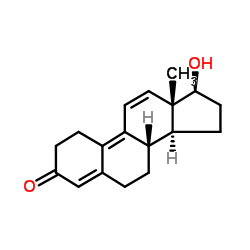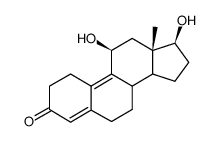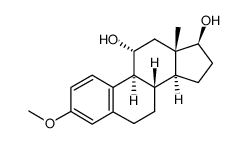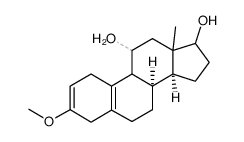This product was successfully added to cart!
品牌商品推荐
更多 >>商品详情
客户评价
| 密度 | 1.2±0.1 g/cm3 |
|---|---|
| 沸点 | 490.8±45.0 °C at 760 mmHg |
| 熔点 | 170°C |
| 分子式 | C18H22O2 |
| 分子量 | 270.366 |
| 闪点 | 208.2±21.3 °C |
| 精确质量 | 270.161987 |
| PSA | 37.30000 |
| LogP | 2.27 |
| 蒸汽压 | 0.0±2.8 mmHg at 25°C |
| 折射率 | 1.605 |
| 储存条件 |
密封于2-8?C的干燥环境中。 |
| 稳定性 |
遵照规格使用和储存不会分解 |
| 分子结构 |
1、 摩尔折射率:77.86 2、 摩尔体积(cm3/mol):226.0 3、 等张比容(90.2K):597.0 4、 表面张力(dyne/cm):48.6 5、 极化率(10-24cm3):30.86 |
| 计算化学 |
1、 疏水参数计算参考值(XlogP):1.9 2、 氢键供体数量:1 3、 氢键受体数量:2 4、 可旋转化学键数量:0 5、 拓扑分子极性表面积(TPSA):37.3 6、 重原子数量:20 7、 表面电荷:0 8、 复杂度:566 9、 同位素原子数量:0 10、 确定原子立构中心数量:4 11、 不确定原子立构中心数量:0 12、 确定化学键立构中心数量:0 13、 不确定化学键立构中心数量:0 14、 共价键单元数量:1 |
| 更多 |
1. 性状:无可用。 2. 密度(g/mL,25/4℃): 1.19 3. 相对蒸汽密度(g/mL,空气=1):无可用 4. 熔点(?C):170 5. 沸点(?C,常压):491 6. 沸点(?C,5.2kPa): 无可用 7. 折射率: 无可用 8. 闪点(?C): 无可用 9. 比旋光度(?): 无可用 10. 自燃点或引燃温度(?C): 无可用 11. 蒸气压(kPa,25?C): 1.1E – 11 12. 饱和蒸气压(kPa,60?C): 无可用 13. 燃烧热(KJ/mol):无可用 14. 临界温度(?C): 无可用 15. 临界压力(KPa): 无可用 16. 油水(辛醇/水)分配系数的对数值: 无可用 17. 爆炸上限(%,V/V):无可用 18. 爆炸下限(%,V/V): 无可用 19. 溶解性:无可用。 |
|
群勃龙毒性英文版
|
| 符号 |

GHS08 |
|---|---|
| 信号词 |
Danger |
| 危害声明 |
H360 |
| 警示性声明 |
P201-P308 + P313 |
| 个人防护装备 |
Eyeshields;full-face particle respirator type N100 (US);Gloves;respirator cartridge type N100 (US);type P1 (EN143) respirator filter;type P3 (EN 143) respirator cartridges |
| 危害码 (欧洲) |
T: Toxic; |
| 风险声明 (欧洲) |
R60 |
| 安全声明 (欧洲) |
S53-S22-S36/37/39-S45 |
| 危险品运输编码 | NONH for all modes of transport |
| WGK德国 | 3 |
| RTECS号 | KG7752000 |
| 海关编码 | 2942000000 |
|
~%

群勃龙
10161-33-8
|
|
文献:Chemistry of Natural Compounds, , vol. 24, # 2 p. 263 – 264 Khimiya Prirodnykh Soedinenii, , vol. 24, # 2 p. 306 – 307 |
|
~%

群勃龙
10161-33-8
|
|
文献:Chemistry of Natural Compounds, , vol. 24, # 2 p. 263 – 264 Khimiya Prirodnykh Soedinenii, , vol. 24, # 2 p. 306 – 307 |
|
~%

群勃龙
10161-33-8
|
|
文献:Chemistry of Natural Compounds, , vol. 24, # 2 p. 263 – 264 Khimiya Prirodnykh Soedinenii, , vol. 24, # 2 p. 306 – 307 |
|
~%

群勃龙
10161-33-8
|
|
文献:Chemistry of Natural Compounds, , vol. 24, # 2 p. 263 – 264 Khimiya Prirodnykh Soedinenii, , vol. 24, # 2 p. 306 – 307 |
| 海关编码 | 2942000000 |
|---|
|
Evidence of small modulation of ethinylestradiol induced effects by concurrent exposure to trenbolone in male eelpout Zoarces viviparus Environ. Pollut. 178 , 189-96, (2013)
The interaction of xenobiotics is common in aquatic ecosystems; therefore, we wanted to evaluate if trenbolone (TB) modulates the effects of 17α-ethinylestradiol (EE2). Male eelpout (Zoarces viviparus…
|
|
|
Screening estrogenic activities of chemicals or mixtures in vivo using transgenic (cyp19a1b-GFP) zebrafish embryos. PLoS ONE 7 , e36069, (2012)
The tg(cyp19a1b-GFP) transgenic zebrafish expresses GFP (green fluorescent protein) under the control of the cyp19a1b gene, encoding brain aromatase. This gene has two major characteristics: (i) it is…
|
|
|
17β-trenbolone, an anabolic-androgenic steroid as well as an environmental hormone, contributes to neurodegeneration. Toxicol. Appl. Pharmacol. 282(1) , 68-76, (2015)
Both genetic and environmental factors contribute to neurodegenerative disorders. In a large number of neurodegenerative diseases (for example, Alzheimer’s disease (AD)), patients do not carry the mut…
|
|
|
4,9,11-Estratrien-17b-ol-3-one |
|
Trienolone |
|
17-β-Trenbolone |
|
Estra-4,9,11-trien-3-one, 17-hydroxy-, (17-β)- (9CI) |
|
MFCD00214395 |
|
17β-hydroxy-estra-4,9,11-trien-3-one |
|
17b-Hydroxy-19-norandrosta-4,9,11-trien-3-one |
|
19-Norandrosta-4,9,11-trien-17b-ol-3-one |
|
Estra-4,9,11-trien-3-one, 17-hydroxy-, (17β)- |
|
(17β)-17-Hydroxyestra-4,9,11-trien-3-one |
|
Trenbolone |

















